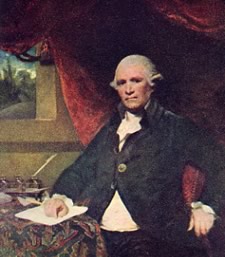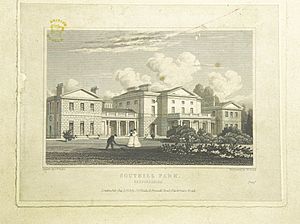Samuel Whitbread (1720–1796) facts for kids
Quick facts for kids
Samuel Whitbread
|
|
|---|---|

Samuel Whitbread (1720–1796) by Sir Joshua Reynolds
|
|
| Member of the Great Britain Parliament for Bedford |
|
| In office 1768–1774 Serving with Richard Vernon
|
|
| Preceded by |
|
| Succeeded by |
|
| Member of the Great Britain Parliament for Bedford |
|
| In office 1775–1790 Serving with
|
|
| Preceded by |
|
| Succeeded by |
|
| Member of the Great Britain Parliament for Steyning |
|
| In office 1792–1796 Serving with
|
|
| Preceded by |
|
| Succeeded by |
|
| Personal details | |
| Born | 20 August 1720 Cardington, Bedfordshire, England |
| Died | 11 June 1796 (aged 75) |
| Children | Samuel Whitbread |
| Occupation | Brewer |
Samuel Whitbread (born August 30, 1720 – died June 11, 1796) was an important English businessman. He was a brewer, which means he made beer. He also became a Member of Parliament, helping to make laws for the country. In 1742, he started his own brewing business. This business later grew into a very famous company called Whitbread & Co Ltd.
Contents
Early Life and Learning
Samuel Whitbread was born on August 20, 1720, in a place called Cardington in Bedfordshire, England. He was one of eight children in his family.
When he was 12 years old, Samuel studied with a local clergyman for two years. At 14, he moved to London to live with relatives, probably his uncle. At 16, his family paid £300 for him to become an apprentice at a brewery. This meant he would learn the brewing trade from an expert named John Wightman.
Building a Brewing Business
After learning all about making beer, Samuel Whitbread started his own business in 1742. He partnered with Godfrey and Thomas Shewell. He invested £2,600 in two of their smaller breweries. One was the Goat Brewhouse, which made a dark beer called porter. The other was in Brick Lane, where they made lighter beers.
Growing the Brewery
People started to really like the strong, dark porter beer. Samuel Whitbread realized he needed a much bigger place to make enough beer for everyone. So, in 1750, he moved his business to a larger location in Chiswell Street.
He started fresh, using the newest technology to make beer on a large scale. He stored the beer in huge vats. His brewery was also one of the first to use a steam engine. In 1785, he bought a special steam engine, known as the Whitbread Engine, from James Watt's company.
Samuel Whitbread wasn't the first to make porter beer. But he was the first to make it in huge amounts and sell it widely. This happened at a time when more people in the UK started drinking beer. This was partly because new rules were made to control the sale of gin.
A Successful Company
By 1760, Whitbread's brewery was the second largest in London. It made almost 64,000 barrels of beer every year. By 1770, Samuel had bought out his partners for £30,000.
By the end of the 1700s, Whitbread's business was the biggest beer producer in London. In 1796, it made 202,000 barrels of beer! In May 1787, even King George III and Queen Charlotte visited the brewery. By 1793, Samuel Whitbread had become a "Freeman of the Brewers' Company," which was an important title in the brewing world.
A Member of Parliament
Besides being a successful brewer, Samuel Whitbread also served in government. He was appointed High Sheriff of Hertfordshire for 1767–68. Then, in 1768, he was elected as a Member of Parliament for Bedford. He held this position until 1790. Later, he represented another area called Steyning from 1792 to 1796.
Samuel Whitbread was an early supporter of ending slavery. He took part in discussions about ending slavery in the House of Commons in 1788.
His Family and Wealth
Samuel Whitbread married twice. His first wife was Harriet Hayton. They had two daughters and one son. Their son, also named Samuel Whitbread, became a politician like his father.
Harriet died in 1769 and was buried in Cardington Parish Church.
His second wife was Lady Mary Cornwallis. They had one daughter named Mary.
Samuel Whitbread became very rich from his successful brewery. He bought several large estates, which are big pieces of land with large houses. These included Lord Torrington's Southill Park, Elstow Manor, and other properties in Bedfordshire and High House, Purfleet, Essex. His land purchases were worth around £400,000 at the time. This would be worth a lot more money today!
Samuel Whitbread passed away on June 11, 1796. People at the time thought he was worth over a million pounds, which was an enormous amount of money back then.
 | Dorothy Vaughan |
 | Charles Henry Turner |
 | Hildrus Poindexter |
 | Henry Cecil McBay |


